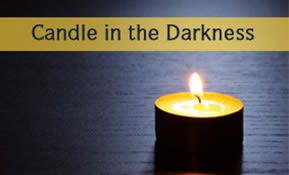
Affirming God’s Presence
Even when death stared them in the face and they could have fought and won, Dovid’s men did not move a finger until they received...

Even when death stared them in the face and they could have fought and won, Dovid’s men did not move a finger until they received the signal from heaven.
Shlomo Hamelech (King Solomon) listed all the different periods in life: “A time to live, a time to die, a time to plant, a time to sow…” (Kohelet 3:1-8). There are twenty-eight in all. Each person passes through all of them in life and, in every instance, must serve God accordingly. Rebbe Nachman often spoke about the need to cling to God in every situation, as the verse says “I will hold Him and not let Him go” (Shir Hashirim 3:4). No matter what happens to me, I will affirm my faith in the Holy One, because I realize that whatever happens refines my soul.
Dovid Hamelech (King David) said to God: “Master of the World, why do we say ‘God of Avraham, God of Yitzchak, and God of Yaakov, but not God of Dovid?” (Sanhedrin 107a).
This is a remarkable question. How could Dovid make such a request? What did he see in his relationship to God to warrant a comparison between him and the holy Patriarchs, and to link God’s Name to his by Jews forever? Obviously, Dovid Hamelech must have recognized in himself a trait worthy of such honor.
The answer seems to be his ability to cling to God in every situation. Chazal, in the Midrash, quote different verses that reveal this trait:
“Rav Acha said in the name of Rav Levy: “Dovid said to God: Whether You treat me with mercy or with judgment; unto You, O Lord, I will sing” (Tehillim 101:1). Rav Shmuel bar Nachmani said that we learn this quality from a different verse: ‘In God (YHVH) I will praise His word, in the Lord (Elokim) I will praise His word’ (Tehillim 56:11). ‘Whether God deals with me in His attribute of kindness, or His attribute of justice, I will praise Him’ (God’s Name YHVH refers to His attribute of mercy; His Name Elokim refers to the attribute of justice). Rabbi Tanchum said that we learn it from here: “Trouble and sorrow I find, I will call upon the Name of the Lord… I will raise the cup of deliverance, and call upon the Name of the Lord.’ (Tehillim 116:3, 4, 13). Whether he was experiencing trouble and sorrow, or raising the cup of deliverance, Dovid never stopped calling upon God” (Brochos 60b).
Even in the Face of Death
There are countless statements by Chazal concerning Dovid’s unwavering faith in God. “Every day, during the twenty-two years when the Divine Presence departed from King Dovid, he filled a cup with tears and ate his bread with ashes.” That is to say, the entire time he longed only for God, cried to Him, and yearned for His deliverance.
Dovid’s devotion was so great that it did not waver even in the face, of death, as seen in the Book of Samuel, when Dovid and his men fought the Philistines:
“And Dovid inquired of God (through the Urim u’Tumin). And God said to him, ‘Do not go directly up against the Philistines. Rather, circle around them, and come upon them from behind the grove of trees. When you hear the sound of marching on the top of the trees, then lift up the battle cry and camp of the Philistines’” (II Samuel 5:2, 24).
The Midrash elaborates: God said to Dovid, “Do not attack until you see the tree tops sway. Otherwise, you have no permission to lift your hand against the enemy, even if they approach you.” The troops went forth and the enemy came up against them. The Philistines were only a few feet away, yet Dovid did not move. “What are we waiting for?” the soldiers all cried. “God commanded us not to attack until the tree tops sway. Better to die the death of the righteous than live as sinners. Lift your eyes to the Holy One!” As soon as they saw the tree tops sway, the began the attack, as it says, “And Dovid did as God had commanded. And he smote the Philistines from Geva to the outskirts of Gezer” (ibid. 5:25).
Even when death stared them in the face and they could have fought and won, Dovid’s men did not move a finger until they received the signal from heaven. Had it not been for that, they were all ready to die in sanctification of God’s Name.
God, My Heart is not Haughty
On the other hand, even when he prospered, Dovid did not become haughty. The fear of God was always before him. The Talmud comments on Tehillim 131: “‘A Song of Ascents, of Dovid. God, my heart was not haughty’ when Samuel anointed me king; ‘nor my eyes lofty’ when I slew Goliath: ‘nor did I delve in matters too lofty’ when I brought the Ark to Jerusalem’ ‘and too wonderful for me’ when I returned to my throne as king” (Yerushalmi Sanhedrin 2:4).
On this same verse, the Zohar says:
“King Dovid was a supernal king who ruled over all the kings of the earth, yet he never even considered straying from the proper path. His heart was always humble before God, he toiled at Torah with the strength of a lion, and his eyes were always down cast because of his fear of God. When he walked among the people, he had no pride at all. Thus he said, ‘God, my heart was not haughty,’ even though I rule over all kings; ‘nor my eye’s lofty,’ when I stand before You and toil in Torah; ‘nor did I delve in matters too lofty and wonderful for me,’ when I walk among the people.”
The Zohar concludes: “If King Dovid felt this way, how much more so should everyone else!”
From the Ends of the Earth I Will Call to You
Reb Nosson wrote that King Dovid’s main aspiration was to encourage every Jew to hold fast to God throughout all of life’s trials. Even if a person feels like he is in the depths of hell, he should never abandon hope, God forbid. The entire Book of Psalms is based upon this: to cry out to God, even when one wants to say, “I am drowning in the depths without a foothold. I have reached the depths of the water, the waves cover me” (Tehillim 69:3). Dovid said these prayers in a state of prophecy that made them applicable until the very last generation. If a person can hold onto God, even when he has reached the depths, even “from the ends of the earth,” he will experience an incredible sense of renewal.
Dovid at Midnight
King Dovid promised God that he would never sleep through midnight. According to the Zohar his entire reign depended upon his rising at that hour, as it is stated “At midnight I rise to give thanks to You,” (Tehillim 119:62). The verse does not say, “I rose to give thanks to You, rather “I rise,” always, and will forever be bound to You (Zohar 2:213b). The Zohar also says: “When the north wind blows and midnight arrives.. Because of this, Dovid and his descendants inherit the kingship forever” (Zohar 3:23ab).
Reb Nosson explains this statement in Likutey Halachos:
“As evening progresses, the more the sun descends, the darker it becomes. By midnight, the sun is at its furthest point and a heavy darkness rests on the world. Precisely at that moment, in awesome spiritual attachment, Dovid Hamelech would stand before God with songs and praise. Through this, he drew down light until the very last generations, so that even in the utmost darkness, when a person cannot see even a glimpse of light, he can cling to God’s presence. This was Dovid’s achievement, to illuminate the darkness forever. Thus we say: “Dovid, King of Israel, lives forever.”
It was Fitting for God to Call His Name Upon Him
Not just Dovid Hamelech, but any person who can achieve such complete trust in God, deserves to have God’s Name called upon him. The Midrash says: “Had Iyov (Job) not complained when he was afflicted, in addition to saying, God of Avraham, God of Yitzhak, and God of Yaakov, we would also be saying, God of Job” (Yalkut Shimoni, Iyov 23).
Thus the Holy One is called “God of Israel,” because the Jewish People, like their forefathers, never have and never will abandon Him. On the verse: “Let us go and wipe them out from being a nation” (Tehillim 83:5), the Midrash comments: “As long as Israel exists, God is known as ‘God of Israel,’ but if Israel were not to exist, whose God would He be called? There is no other nation so eternally bound to God as to inherit Israel’s portion” (Midrash Tehillim 83).
This is why the relationship between God and Israel is called a covenant, which implies a permanent relationship, as in “An eternal covenant between Me and the Children of Israel” (Shemot 31:16); “I will make with you an eternal covenant” (Yeshiyahu 55:3); “He established it with Yaakov as a law; with Israel, and eternal covenant” (Tehillim 105:10); “And My covenant shall be in your flesh; an eternal covenant (Bereishit 17:13).
Thus Says the Lord, the God of Dovid
This is why Dovid wanted God to call His Name upon him, so that we should say “God of Dovid.” And ultimately, his wish was fulfilled, for the verse says: “Thus says the Lord, the God of Dovid, your father…” (II Melachim 20:5). God promised Dovid, “And I will make you a name like the names of the great ones, in the earth” (II Shmuel 7:9), like Avraham, Yitzchok and Yaakov – the Patriarchs themselves (Rashi on Pesachim 117b). According to the Talmud, this is why we say Magen Dovid – the shield of Dovid.
The Ramban writes: “Our Sages have said that the Patriarchs were a chariot of the Divine Presence. Yet every chariot has at least four wheels. Who is the fourth? Is it not our master, King Dovid? Our Sages did not explicitly state that he was the fourth wheel, but we find that God’s Name was called upon all four of them, and upon no others” (HaEmunah v’haBitachon by the Ramban.).
(Used with permission from the author. From the book “In all my Ways” Keren Ohr Publications)







Tell us what you think!
Thank you for your comment!
It will be published after approval by the Editor.